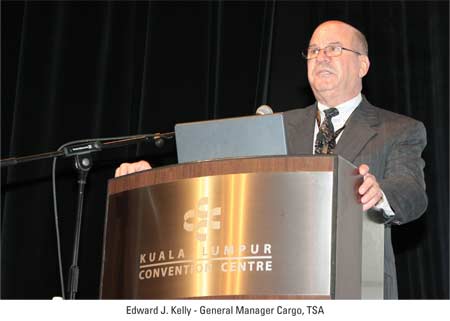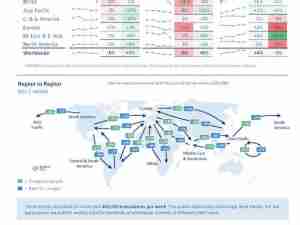The TSA's first milestone of 50% piece level screening for cargo carried on passenger aircraft comes into force in February. It will rise to 100% in August 2010 as part of the US Department of Homeland Security's mandate to provide a level of security for cargo commensurate to that for passenger baggage. These deadlines are congressionally-imposed and not flexible, he said.
The Administration's policy for international inbound cargo, he stated, includes harmonization with foreign governments through open dialogue on the vulnerabilities of the international aviation system.
Giving TIACA delegates an update on the program, he emphasised the efforts being taken to avoid causing bottlenecks and congestion at airports as a result of the required screening process. TSA will enable secure, audited and certified shipper and forwarder facilities to screen cargo earlier in the air cargo supply chain, notably through the rollout of its Certified Cargo Screening Program (CCSP).
Speaking in the same session on security, Tom Wheelwright, Senior Vice President Public Policy Asia Pacific for DHL Express, said customers of express delivery services have always demanded secure supply chains due to the critical nature and high value of their shipments. As a result, the industry has been making significant investments in the security of premises and processes for many years, even before 9/11. Recognising that authorities now see the need for much greater levels of control in response to the current security situation, he called for a 'co-ordinated and balanced policy approach'.

Authorities should not be too reliant on physical measures rather than 'intelligence' available from industry and other government agencies, he said, and highlighted the need for alignment in the security requirements of Customs, aviation security and transport. He called for a 'whole of government approach' which considers ICAO, the WCO SAFE Framework and others. The nightmare scenario for the express delivery industry in terms of security policy would be a red lane/green lane system and the responsibility for the security compliance of customers, he concluded.
Giving an airline perspective, Captain Roshan Joshi, Senior Manager, Corporate Safety, Security and Quality for Singapore Airlines Cargo gave a practical insight into how the airline has conducted a gap analysis in order to comply with new security regulations and is tailoring solutions for stations affected by changing legislation. He said working with Indirect Air Carriers (IACs) to meet these requirements would be a preferred approach for many airlines.
Nearly 3,000 air cargo industry visitors from all over the world attended the three-day exhibition and conference in Kuala Lumpur. It attracted 218 exhibitors representing all areas of the air cargo supply chain, including 68 airlines.
Shahari Sulaiman, Managing Director of event host, MASkargo, said: 'We are delighted with the outcome of the Air Cargo Forum. As hosts, we managed to increase MASkargo's brand recognition internationally and also create a better awareness of our products and services in the airfreight industry locally. The teamwork between TIACA and MASkargo made hosting ACF 2008 a great experience. Apart from the commercial benefits of participating in the Forum, we hope that the delegates enjoyed the warm Malaysian hospitality.'
The TIACA event also attracted strong support from members of the Malaysian Government with speeches by The Honorable Dato' Sri Mohd Najib Tun Abdul Razak, Deputy Prime Minister






